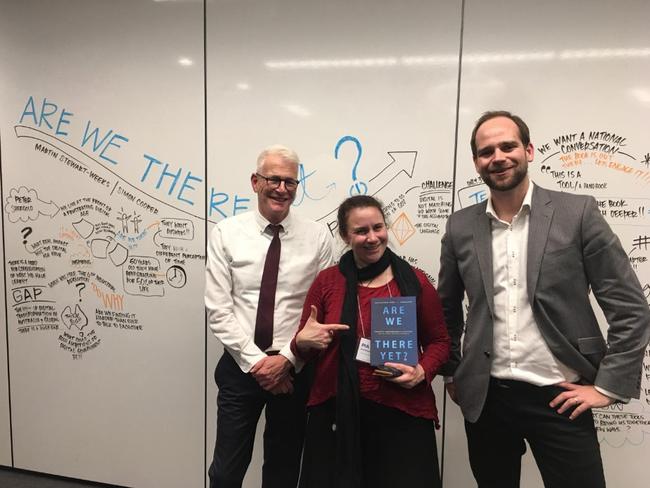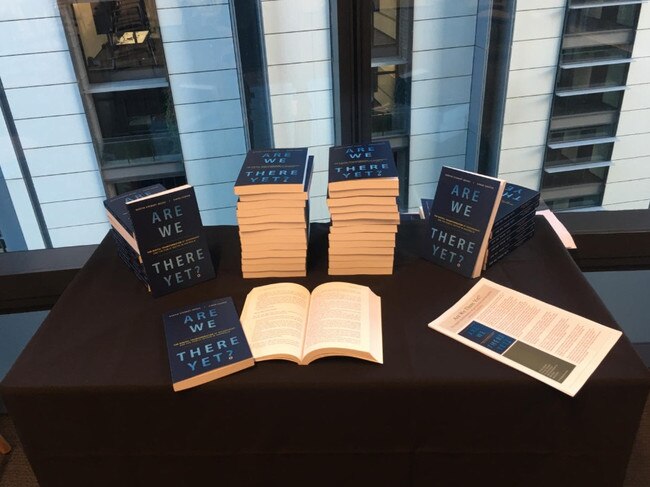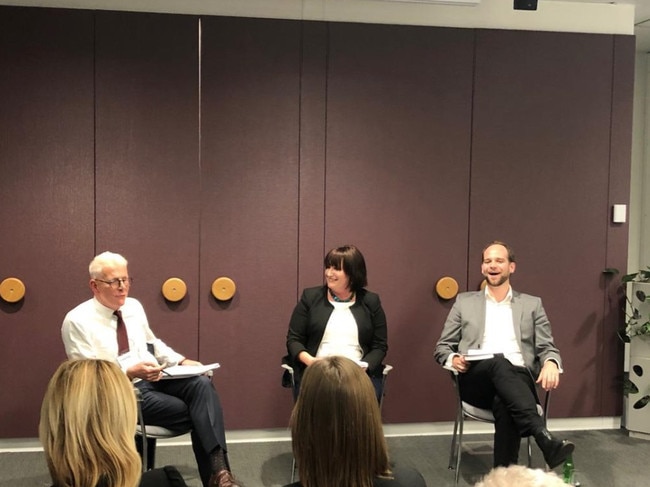Digital transformation of Government ‘a story half told’
Digital transformation across the public sector has stalled and now two experts have written a new book aimed at shaking things up to help Australia lead the way in this crucial discipline
Digital transformation of government is a story half told and is a project that is in danger of missing the point despite some outstanding achievements.
Now two senior Australian transformation executives have written a manifesto for a renewed national focus on the government’s digital agenda.
Former cabinet secretary and Western Sydney University vice-chancellor Peter Shergold AC has written the forward to the new book: Are we there yet? The digital transformation of government and the public sector in Australia.
Below is an insightful and informative Q&A with the book’s authors Martin Stewart-Weeks and Simon Cooper.
How has this new book been received?
Positively. No one has disagreed with our opening statement that digital transformation across the public sector has stalled. After over 25 years of considerable time, money, and effort at national, state, and local levels, we’re still not ‘there’ yet. And there’s been much interest from all over Australia and overseas with people particularly keen to discuss our manifesto
The book can be seen as quite provocative and if even if our ideas are just considered that will shake up the public service and the way in which government is run in Australia. So we’re starting to get feedback from public servants, academics, former Ministers, technologists and industry representatives that they agree with us.
Our timing now feels perfect with the direction of the NSW government in line with our thesis about government being about putting citizens (or customers as they would say first) and the indications of the Morrison government to reform the public service.
We were delighted that Peter Shergold AC, the Chancellor of Western Sydney University and Former Secretary, Department of Prime Minister & Cabinet wrote the forward for the book and launched it recently. That has helped shall we say more established government types sit up and take notice that digital transformation isn’t just for the technology or digital training wearing teams but for all public servants to have an interest in.

Why has digital transformation in the public sector stalled and are there particular sectors that are worst hit and why?
Our view is that the story of digital transformation in Australia, and globally, is missing half the plot. And therein lies a profound problem.
The reason is that successive waves over the last 20 or 30 years of investment in digital transformation have focused largely on improving the transactional functions and activities of government. They have failed to embrace a bigger challenge — the need for governing and government to rethink a new ‘theory of the business’ — which that same revolution has caused and to which it is an inescapable part of the answer.
At the heart of the new theory of the business for digitally transformed public work is a mission that is less concerned with the accumulation and management of public power and authority and more concerned with the assembly of collective intelligence to collaboratively solve problems.
That is a hugely exciting prospect for public servants.
That said there are some good examples of transformation which we discuss in the book including Service NSW (which is why the new Services Australia incorporating parts of the Department for Human Services is being modelled on it) and actually tax and immigration services are generally good.

Why is it so important to keep investing in this area?
Our book is a call-to-action for a new ‘national mission’ for the digital transformation of government and the public sector in Australia (and further afield). This should build on what has been done, but at a new speed, scale and intensity that matches its national significance for success in the digital global economy and for a stronger and more accountable democracy.
We’re arguing for a different kind of investment focus. Spending more money in the same way such as around government needs e.g. individual department websites and services rather than citizens won’t get us there at state or national level. We advocate for investment in, and curation of, the necessary public digital infrastructure that will enable and amplify the process of digital transformation will have to be increasingly national, integrated and shared.
This will be a major national endeavour, as significant and visible as public physical infrastructure,
such as roads and airports, is to the development of Australia.
In your view, which sectors should be prioritised for investment in digital transformation?
It’s not so much sectors, indeed our book is relatively sector agnostic. Instead our book puts forward the overall point that we as a nation need to shift our focus from technology modernisation to meeting customer expectations of the performance of government in a digital age. The prize is the restoration of trust and legitimacy in government and the ability to harness the power and creativity of the public sector for inclusive prosperity.
Part of doing that should be public service learning and capability programs to dramatically re-skill the workforce including with current and new digital tools and technologies while blending these with enduring skills of good public service work.

Which countries are leading the way in this area?
Well generally it’s the countries who are the best governed. There shouldn’t be a difference between ‘digital’ and general transformation. In this case, comparable to Australia, the UK, South Korea and Denmark as well as Singapore are leading the way. Currently we’re not close to meeting the stated ambition, in the 2018 Digital Transformation Strategy, to become a top-three digital government compared to our global peers.
All of these countries have gone well beyond the argument of whether digital transformation is a good idea or indeed needed and are busy reorientating their public services and way of governing using these contemporary tools and ways of working.
That said, Brexit, as a recent UK government report outlined, has meant the UK is not quite as focused as it once was through its Government Digital Service.
As we mentioned earlier, Australia’s taxation services and organisations like Service NSW and Service Victoria as well as the kind of digital marketing Tourism Australia provide are all world leading.
Can you give a couple of practical examples of how digital transformation has stalled?
It’s not fair to single out particular services or programs of work. One of our manifesto statements is that:
No longer should people (citizens) need to spend their spare time working out how to complete transactions using complicated and disconnected government websites, filling in long forms, or waiting on hold. Citizens expect to experience the same quality of interactions in their dealings with government as they do in other parts of their digital lives.
By definition that is happening now and we believe that given Australia’s access to resources and investment there is no reason why that can’t change.
We also advocate for establishing a new national organisation, the Government Transformation Authority (GTA). This would draw together all levels of government, the private sector, the start-up community, and the community sector to drive a national mission that establishes Australia as a world leader in digital transformation of government and the public sector.
The national GTA should combine policy, strategy, people and skills, and digital capability and expertise, including many of the functions and responsibilities currently divided between the national and state versions of digital agencies, central agencies (PM & C, Finance, DPC), the
Public Service Commission, and aspects of the work of major line agencies in areas like health, human services, education, and tax/revenue.

It would be like a super charged version of the Digital Transformation Agency or its predecessor the Digital Transformation Office but with a national remit beyond digital.
Even if setting up an agency like this isn’t feasible or realistic right now, the intent behind this element of the manifesto is clear. We are making the point that digital transformation is a means to an end and not an end in itself. We think we have reached the point where the transformation process has to engage deeper questions of strategy, purpose and performance of government at every level, including policy and regulation, and not just to add valuable, but limited transactional improvements to aspects of service delivery.
Was there a particular event in your career or shortcoming that you noticed that spurred you to delve further into this topic?
This book was born out of caffeine-fuelled conversations where we discovered a shared interest for using digital technology and culture to make public services better, and an equally shared frustration that the speed of digital transformation in Australia seemed to be slower than we were seeing and hearing about in other countries. You only have to think of how much harder it is to interact with government such as sorting out anything to do with Medicare or trying to find ‘one version of the truth’ to do anything compared to dealing with private organisations.
As we have researched and written this book, the level of debate has all but disappeared. That feels wrong when the potential of digital transformation is to make Australia truly the greatest place on earth to live.
So, rather than admire the problem and complain, we decided we’d write down how to get there. We want to spark a debate and discussion.

We drew on Martin’s more than 30 years in and around policy and government at the national and state levels in Australia, as well as his time at Cisco and helping to shape the emerging field of social innovation, and on Simon’s recent experiences in Sydney, Canberra, and London working with governments both as a public servant and as a consultant.
After discussing our concept for a book with government, digital leaders, and start-up owners, we recognised a demand from public-sector leaders, workers, and advisers for some guidance to inform their thinking and actions in Australia and beyond.
This is a book written by two people who make a living from digital transformation in government so it is accessible and is written in a way that will instantly resonate and connect with audiences in Australia and around the world.
How would you define digital transformation in a couple of sentences?
This is our definition used in the book: Digital transformation is a way of seeing and rethinking the entire business of governing, government, and the work of the public service, and to better serve citizens and customers in a democratic society and across all levels of government’.
What are you hoping will happen as a result of putting the book out?
Well reading the book would be ideal!
Well we’d love to spark the sense of urgency and have the actions we’ve suggested in the manifesto get at least considered if not adopted at state and federal level across Australia and for something similar to happen elsewhere in the world.
Perhaps more practically and in the shorter-term we are hoping that public servants at all levels, experiences as well as those coming into the public service and working with them use the book to inspire them to learn more about the digital tools and approaches that government can use right now.
In turn that should foster a mindset change that echoes the new theory of the business around government being here to help problem solve using collective intelligence, digital tech and tools etc. to make a real differences to people’s lives
About the authors
Martin Stewart-Weeks is an independent Adviser who works at the intersection of government, public policy, technology and innovation. He has held roles as a Ministerial chief of staff and policy Adviser, and has worked in industry at Cisco, Deloitte and PwC.
Simon Cooper is a director who specialises in the digital transformation of government for a leading digital consultancy in Sydney covering governments across Australia and the globe.
Fore more information or to purchase the book, go online: www.arewethereyetdigital.com.


